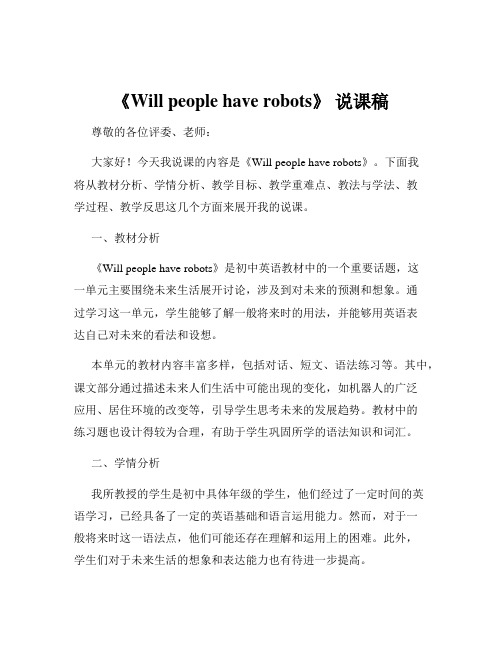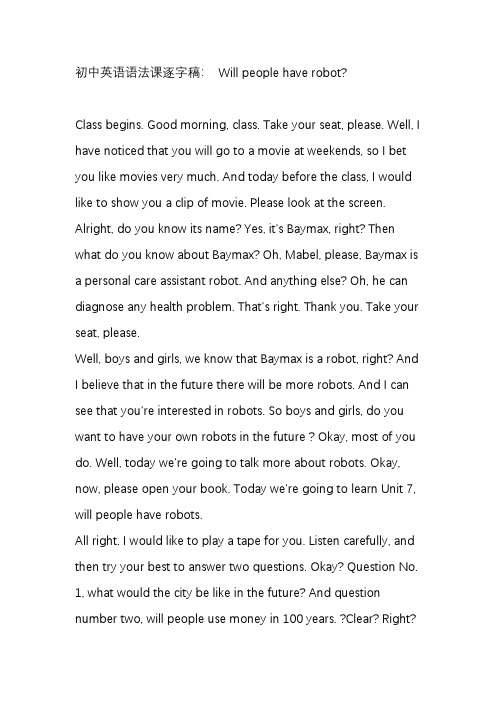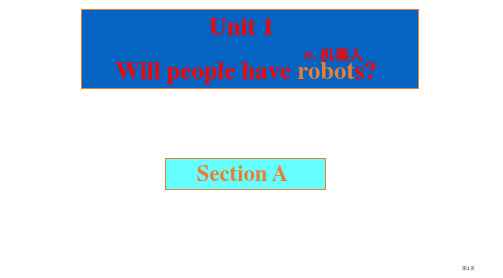14.初中英语教师面试:语法课《Willpeoplehaverobots》全英文教案及试讲逐字稿(2020年最新)
《Will people have robots》 说课稿

《Will people have robots》说课稿尊敬的各位评委、老师:大家好!今天我说课的内容是《Will people have robots》。
下面我将从教材分析、学情分析、教学目标、教学重难点、教法与学法、教学过程、教学反思这几个方面来展开我的说课。
一、教材分析《Will people have robots》是初中英语教材中的一个重要话题,这一单元主要围绕未来生活展开讨论,涉及到对未来的预测和想象。
通过学习这一单元,学生能够了解一般将来时的用法,并能够用英语表达自己对未来的看法和设想。
本单元的教材内容丰富多样,包括对话、短文、语法练习等。
其中,课文部分通过描述未来人们生活中可能出现的变化,如机器人的广泛应用、居住环境的改变等,引导学生思考未来的发展趋势。
教材中的练习题也设计得较为合理,有助于学生巩固所学的语法知识和词汇。
二、学情分析我所教授的学生是初中具体年级的学生,他们经过了一定时间的英语学习,已经具备了一定的英语基础和语言运用能力。
然而,对于一般将来时这一语法点,他们可能还存在理解和运用上的困难。
此外,学生们对于未来生活的想象和表达能力也有待进一步提高。
在学习风格方面,这个年龄段的学生充满好奇心和求知欲,喜欢通过生动有趣的活动和情景来学习英语。
因此,在教学过程中,我将设计多样化的教学活动,激发学生的学习兴趣,提高他们的参与度。
三、教学目标1、知识目标(1)学生能够掌握本单元的重点词汇,如 robot, future, prediction 等。
(2)学生能够熟练运用一般将来时进行表达,如“Will people have robots in the future?” “Yes, they will /No, they won't”2、技能目标(1)能够听懂关于未来生活的对话和短文,并获取关键信息。
(2)能够用英语流利地表达自己对未来的预测和想法。
(3)能够阅读并理解与未来主题相关的文章,提高阅读能力。
教师资格证初中英语说课:Willpeoplehaverobots?教师资格证说课模板

教师资格证初中英语说课:Willpeoplehaverobots?教师资格证说课模板多看优秀教师资格证说课稿,学习其中的精髓,可以帮助你写好说课稿哦。
教师资格考试网为您整理“教师资格证初中英语说课:Will people have robots ?”,来看看详情吧!八年级下册说课稿 Unit 1Unit 1 Will people have robots ?Teaching goals:1. Words&phrases: robot, paper, less, fewer, simple, unpleasant, factory, seem, etc .2. will 构成的一般将来时态的陈述句、否定句、疑问句及回答.3. There be 句型的一般将来时.4. more , less , fewer 的用法.5. 学习一般将来时态的相关知识,学会对未来进行猜测.6. 对five years ago ,today ,in five years 简洁回顾与展望的方式,贴近实际符合学生心理,激发学习爱好.7. 通过时间对比复习一般过去时态、一般现在时态,巩固一般将来时.Important and difficult points :1. will构成一般将来时态的句式。
2. There be 句型的一般将来时态。
3. more , fewer , less 的用法。
4. How to make predictions .Period 1Teaching procedures:Step 1 Leading in1. Greetings: Welcome to school .What’s the date today ? Who’s on duty today ?Do you enjoy your winter holiday ?Do you finish your homework ?Do you want to live on the moon ?Can you guess what will happen in ten years ?Collect the Ss’ answers and say something about their predictions .Step 2 Pre-task SB Page 2 ,1a .1. Look at the picture :How will the world be different in the future ,100 years from now ?We’re going to talk about sth in 100 years .2. Read each predictions to the class .Explain the new vocabulary .3. Read the instructions .Make sure Ss know what they should do .4. Do it by themselves .5. Talk about the answers with the class .Explain :一般将来时态构成: will / be going to 动词原形Step 3 While-taskSB Page 2 ,1b .1. Practise reading the six predictions .2. Read the instructions to Ss .Circle the things you hear on the recording .3. Play the tape twice .4. Play the tape a third time .At the same time ,check the answers .SB Page 2 , 1c .1. Pay attention to the dialogues .2. Read the dialogues fluently .3. Pairwork .Work in pairs to make predictions according to the sample .4. Ask several pairs to share their conversations to the class .SB Page 3 , 2a & 2b .1. Read the predictions .2. Read the instructions and pointout the sample answer .3. Play the tape twice .Ss circle the word they hear in each sentences: more , less , fewer .4. Check the answers .学生探究: less , fewer 的区别。
初中语法课逐字稿: will people have robots

初中英语语法课逐字稿:Will people have robot?Class begins. Good morning, class. Take your seat, please. Well, I have noticed that you will go to a movie at weekends, so I bet you like movies very much. And today before the class, I would like to show you a clip of movie. Please look at the screen. Alright, do you know its name? Yes, it's Baymax, right? Then what do you know about Baymax? Oh, Mabel, please, Baymax is a personal care assistant robot. And anything else? Oh, he can diagnose any health problem. That's right. Thank you. Take your seat, please.Well, boys and girls, we know that Baymax is a robot, right? And I believe that in the future there will be more robots. And I can see that you're interested in robots. So boys and girls, do you want to have your own robots in the future ? Okay, most of you do. Well, today we're going to talk more about robots. Okay, now, please open your book. Today we're going to learn Unit 7, will people have robots.All right. I would like to play a tape for you. Listen carefully, and then try your best to answer two questions. Okay? Question No. 1, what would the city be like in the future? And question number two, will people use money in 100 years. ?Clear? Right?Let's go.Okay. Now, who would like to share your answers? You please. Yes, in the future cities will be more polluted and there will be fewer trees. Okay.(板书句子:cities will be more polluted and there will be fewer trees )What about the second question? People will not use money in 100 years, right? Yes.Thank you. Take your seat, please.(板书:People will not use money in 100 years.)Then here we got two sentences. Please look at them carefully and then try to find the similarities. Yes, you got it. We can find that they have the same structure, right? Yes, they all have the structure.(划线will be / will not use)" will plus the original form of verbs". Great.(板书will) And actually, you see in the first sentence, we know that it is the positive form and this is the negative form, right? (板书:will+(not)+do)Okay. Please take some notes on your books. Okay. And here comes the challenging parts. Boys and girls, think about it, try to find the usage of this structure. Okay? I'll give you three minutes. You can think about it by yourselves first and then have a discussion with your classmates. Okay? Now let's start. Okay, now stop here. I see some of you have already got the answers. So who like to share your ideas? You please. Oh, that's correct. Yes.Weuse the structure to make predictions. Thank you. Take your seat please.That's right. And actually, in English, we call this grammarpoint :simple future tense. Okay? And its structure is like this. And this is its usage. (手指到板书)Okay?So in our daily life, we use simple future tense to describe things happening in the future. And we also use it to make predictions. Alright? And what's more, boys and girls, in these two sentences we w know we are still going to find out something more like, yes, this word and this word(标注more / fewer)is more and fewer. Okay?So in ou r daily life, in daily usage, we use “more” to modify countable nouns and uncountable nouns ,right? For example, more people, more money, okay? Then what about this one? Fewer, yes, we use fewer to modify countable nouns, for example, fewer trees, right? Yes?And do you know which word we can use to describe or to modify, uncountable nouns? Yes! Less, right? Can you spell it? Less. Great. Please take some notes on your textbooks. Okay. Yes, add it to your textbooks.All right, so this is knowledge we're going to learn today. And next, yes, you know that practice makes perfect. So here we're going to do some exercises. Okay? Alright, so please look at your textbooks. Yes, please finish. Task 3B.All right, you're going to complete some sentences.And while you're completing the sentences, you're going to use the knowledge we've learn today. Okay? Now you may have 3 minutes. Start, please.Finished? Okay. All right. I would like to invite James, could you please share your sentences with us?Nice! kids will not go to school in the future. Okay, thank you. Take your seat, please. And next, boys and goals.I would like to give you another five minutes and then you're going to work in groups of four and you're going to have a discussion about what our school will be like in the future. You can use your imagination. Okay? Alright, now you may start. Share your ideas freely.Okay, time's up. Stop here. Okay, class. All right. Now, who would like to share your ideas about our school in the future? you, please. Oh, wow, that's interesting. Yes, maybe in the future our school will be building the sky.Okay, and we should take planes to go to school. Okay, thank you. Take your seat please. That's creative, right? And I like it. Okay. All right.Well, next boys and girls, it's near the end of our class and please look at the blackboard. Look! what have we learned today? Yes, we've learnt simple future tense, right? Yes, we know it's structure and we know its usage. Great. Well, after class. I need you to imagine if you have a robot, what will it be like? And try to draw pictures for it and write a brief introduction to it. And next class you're going to bring it. Share with us. Okay, so that's all for today. See you next week.。
八年级英语下册《Uni Willpeoplehaverobots》教案 人教版

八年级英语下册《Will people have robots》教案人教版章节一:课题引入教学目标:1. 让学生了解发展的现状和未来趋势。
2. 引导学生思考人们是否会有。
教学步骤:1. 向学生展示一些的图片,让学生猜测这些的用途。
2. 引导学生讨论在我们生活中的作用,如清洁工、医生等。
3. 提问学生:“你们认为未来人们会有吗?为什么?”4. 让学生阅读课文,了解人们是否会有。
教学评价:通过学生参与讨论和回答问题的情况来评价学生的学习效果。
章节二:单词和短语学习教学目标:1. 让学生掌握课文中的生词和短语。
2. 培养学生正确使用这些单词和短语的能力。
教学步骤:1. 让学生跟读课文,标注出生词和短语。
2. 教师讲解生词和短语的意思,并给出例句。
3. 让学生练习使用这些单词和短语造句。
4. 进行小组活动,让学生相互练习使用生词和短语。
教学评价:通过学生造句的正确性和流利度来评价学生的学习效果。
章节三:课文理解教学目标:1. 让学生理解课文内容,掌握课文的主要观点。
2. 培养学生运用所学知识进行思考和分析的能力。
教学步骤:1. 让学生复述课文内容,检查学生对课文的理解。
2. 教师提问,引导学生深入思考课文中的观点。
3. 进行小组讨论,让学生分享自己的观点和看法。
4. 让学生写一篇短文,阐述自己对课文主题的理解和看法。
教学评价:通过学生复述课文、回答问题和小组讨论的表现来评价学生的学习效果。
章节四:语法学习教学目标:1. 让学生掌握本课所学的语法知识。
2. 培养学生正确运用所学语法知识的能力。
教学步骤:1. 讲解本课所学的语法知识,如时态、语态等。
2. 让学生进行语法练习,巩固所学知识。
3. 进行小组活动,让学生相互练习使用所学语法知识。
4. 让学生写一篇短文,运用所学语法知识进行表达。
通过学生语法练习的正确性和流利度来评价学生的学习效果。
章节五:课堂总结与作业布置教学目标:1. 让学生回顾本节课所学内容,巩固知识点。
七年级英语will-people-have-robots省公开课一等奖全国示范课微课金奖PPT课件

3a Look at the pictures of Sally. Then fill in the blanks in the sentences.
1. Five years ago, Sally was in high school
.
2. She played soccer . 普通过去时:be动词、行为 3. She had a cat . 动词都用过去式。
A D 4. Kids won’t go to school. They’ll study at
home on computers.
= they will
A D 5. There will only be one country.
A D 6. People will live to be200 years old.
few—fewer—fewest little—less—least
修饰可数名词
修饰不可数名词
第7页
2b Listen again. Check (√) the predictions you hear.
1. There will be fewer people. √ 2. There will be less free time.
4. Today Sally is in college .
5. She plays a guitar . 普通现在时:动词用现在式,
但当主语为第三人称单数时,
6. She has a dog .
动词要有对应改变。
7. In five years, Sally will be a mother / wife
第2页
will / shall引导普通未来时:普通未来时表示未来发生动作或情 况,最基本结构:will / shall + 动词原形
八年级英语上册Unit7Willpeoplehaverobots全部重要知识点(带答案)

八年级英语上册Unit7Willpeoplehaverobots全部重要知识点单选题1、There ______ an English show this weekend. Shall we go and watch it?A.are going to beB.wasC.will beD.were答案:C句意:这个周末将有一场英语表演。
我们去看好吗?考查there be句型的一般将来时。
根据“There”及“this weekend”可知,此句要用there be句型的一般将来时there is/are going to be或there will be的结构,排除B和D选项。
an English show是单数,be要用is,排除A,故选C。
2、We have decided to sell five things ________ we no longer use.A.thatB.whereC.who答案:A句意“我们已经决定卖5个我们不再用的东西”。
本题考查定语从句。
A.关系代词,指人,在从句中作主语、宾语或表语;B.关系副词,表示地点,在从句中作状语;C.关系代词,指人,在从句中作主语和宾语。
本句话中,先行词为five things,指物,且在从句中作宾语,用that,故选A。
3、—Is Helen here?—No, she isn’t here, She ________ in half an hour.A.arrivesB.arrivedC.will arriveD.has arrived答案:C句意:——Helen在这里吗?——不,她不在,她半个小时后就到了。
考查动词时态。
根据“in half an hour”可知,时间为半个小时后,应用一般将来时;其构成为:will+动词原形。
故选C。
4、---It’s reported that Chinese ___________more than 40 minutes a day reading WeChat(微信).---It’s true. But I think WeChat is taking too much of our time.A.spendB.costC.payD.take答案:A试题分析:句意:——据报道中国人一天花费四十多分钟读微信。
初中:八年级英语Will people have robots教案

新修订初中阶段原创精品配套教材八年级英语Will people have robots教案教材定制 / 提高课堂效率 /内容可修改This teaching plan is customized for the original teaching materials and is suitable for classroom teaching. The content can be modifiedaccording to the actual needs教师:风老师风顺第二中学编订:FoonShion教育八年级英语Will people have robots教案八年级英语will people have robots教案will people have robots 教案unit 1 will people have robots ?teaching goals:1. words&phrases: robot, paper, less, fewer, simple, unpleasant, factory, seem, etc .2. will 构成的一般将来时态的陈述句、否定句、疑问句及回答。
3. there be 句型的一般将来时。
4. more , less , fewer 的用法。
5. 学习一般将来时态的相关知识,学会对未来进行预测。
6. 对five years ago ,today ,in five years 简洁回顾与展望的方式,贴近实际符合学生心理,激发学习兴趣。
7. 通过时间对比复习一般过去时态、一般现在时态,巩固一般将来时。
important and difficult points :1. will构成一般将来时态的句式。
2. there be 句型的一般将来时态。
3. more , fewer , less 的用法。
4. how to make predictions .period 1teaching procedures:step 1 leading in1. greetings: welcome to school .what's the date today ? who's on duty today ?do you enjoy your winter holiday ?do you finish your homework ?do you want to live on the moon ?can you guess what will happen in ten years ?collect the ss' answers and say something about their predictions .step 2 pre-tasksb page 2 ,1a .1. look at the picture :how will the world be different in the future ,100 years from now ?we're going to talk about sth in 100 years .2. read each predictions to the class .explain the new vocabulary .3. read the instructions .make sure ss know what theyshould do .4. do it by themselves .5. talk about the answers with the class .explain :一般将来时态构成:will / be going to +动词原形step 3 while-tasksb page 2 ,1b .1. practise reading the six predictions .2. read the instructions to ss .circle the things you hear on the recording .3. play the tape twice .4. play the tape a third time .at the same time ,check the answers .sb page 2 , 1c .1. pay attention to the dialogues .2. read the dialogues fluently .3. pairwork .work in pairs to make predictions according to the sample .4. ask several pairs to share their conversations to the class .sb page 3 , 2a & 2b .1. read the predictions .2. read the instructions and point out the sample answer .3. play the tape twice .ss circle the word they hear in each sentences: more , less , fewer .4. check the answers .学生探究:less , fewer 的区别。
部编版八年级英语上册Unit7Willpeoplehaverobots带答案知识点总结归纳

(名师选题)部编版八年级英语上册Unit7Willpeoplehaverobots带答案知识点总结归纳单选题1、They usually go shopping ______ their lunch time.A.againstB.amongC.betweenD.during2、It usually takes us quite a long time to ________ master a skill. A.trulyB.simplyC.hardlyD.probably3、Thanks for letting us borrow your camera. We__________it to you next Monday.A.returnB.will returnC.have returned4、—There ________ a Chinese Characters Dictation (汉字听写大赛) in our school next Friday. Did you tell Olive about it?—Oh, I ________. I will call her at once.A.will be; forgotB.is going to have; forgotC.are going to be; forgetD.will be; forget5、— Do you often go swimming_____ Sunday mornings?— Yes. Why not _____with me this Sunday?A.on, goB.in; to goC.on; goingD.in going6、Mr Brown ________ to China last year and ________ in love with this country.A.comes; fallsB.came; fellC.came; fallsD.comes; fell7、Jack is good at math, so he can’t ________ that he didn’t pass the math exam. A.promiseB.describeC.believeD.relax8、Mother’s Day is_____the second Sunday in May in the United States.A.onB.inC.at语法填空9、The old buildings are too _________ (danger) for them to live in.10、We’re told that a charity show ________ (take) place next Sunday.11、Swimming alone in the river is _______ (danger) for children.12、We ________ (have) a picnic if it is fine tomorrow.13、It is ________ (possible) for us to finish the work in such a short time.完成句子14、我认为在2060年你想要的东西都会免费。
- 1、下载文档前请自行甄别文档内容的完整性,平台不提供额外的编辑、内容补充、找答案等附加服务。
- 2、"仅部分预览"的文档,不可在线预览部分如存在完整性等问题,可反馈申请退款(可完整预览的文档不适用该条件!)。
- 3、如文档侵犯您的权益,请联系客服反馈,我们会尽快为您处理(人工客服工作时间:9:00-18:30)。
十四、
语法教学
题目:Will People have robots?
Some robots are very human-like. They can walk and dance like people. Some scientists think that in the future they will make r obots more like humans. This may not happen in the near future, but at some point, robots will
even be able to talk like people. However, some s cientists disagree. James White believes that robots will not be able to do the same things as we
can. For example, he thinks that robots will never be able to wake up and know where they are . Which side do you agree with?
要求:
1.根据文章讲解划线句子的语法知识,讲解一般将来时态;
2.体现教师引导作用;
3.试讲过程体现师生互动;
4.全英试讲
5.试讲时间约10分钟。
教案:
Will people have robots?
1. Teaching aims
1) Knowledge aim
Students can understand the rules of simple future tense and also the structure,will+do…,will + (not/never) be able to….
2) Ability aim
Students can use the simple future tense to describe things happened
in the future.
3) Emotional aim
Students will be more likely to have the awareness to find the rules
in English learning.
2. Important and difficult points
1) Important point
Help students to understand the rules of the simple future tense.
2) Difficult point
Guide students to use the grammar point to describe things in daily
life.
3. Teaching and learning methods
Task-based teaching method;Situational teaching method; Communicative teaching method; Cooperation learning method; Independent learning method.
4. Teaching procedures
Step 1: Lead in
Teacher will draw simple pictures of robots and have a free talk with
1。
